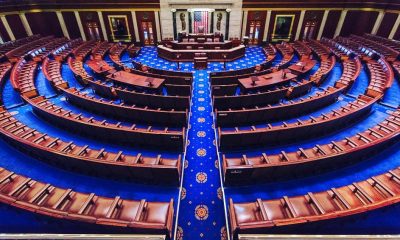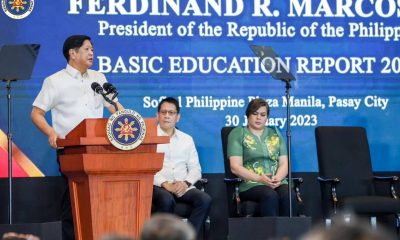Business and Economy
Pres. Duterte to gov’t agencies: Cut red tape
MANILA, Aug. 9 — President Rodrigo Duterte has reminded government agencies dealing with businesses to cut red tape and urged businessmen to report those who are engaged in corruption.
“Corruption is really one I don’t like,” Pres. Duterte said during his keynote address to businessmen at the 2017 Sulong Pilipinas, a Philippine Development Forum at the EDSA Shangri-la on Wednesday.
In order to make government transactions faster, Pres. Duterte said he wants to group government offices in one building.
“If you cannot group together, I will force the online,” he said. “If I said 15 days, do it 15 days,” he added in Filipino.
Pres. Duterte ordered for faster processing of documents in government offices as he emphasized that making it harder for businesses and individuals to transact make the government “useless”.
During the event, one of the recommendations from the private sector is to further ease doing business by converging different agencies, including local government units. It was also in last year’s Sulong Pilipinas that the 10-point socioeconomic agenda of the Duterte administration was presented.
In the latest Doing Business Report of the World Bank, the Philippines ranked 99, moving up four notches from rank 103 in the 2015 report.
However, the same report noted that in Starting a Business indicator, the country’s ranking declined by six spots, from 165th spot to 171st spot. (PNA)























bernard diaz
August 11, 2017 at 7:38 AM
Corruption Continues to Fester in the Armed Forces of the Philippines
It was about time that the AFP pulled out of the Marawi battle operations the FA-50, which sadly killed friendly forces, adding to the gory record of the Air Force in its conduct of close air support. The soldiers must be asking, “air support for whom? For the Maute ISIS or for us?” Despite being vaunted as the Philippines’ most advanced aircraft, the FA-50 was so tainted with corruption that it was acquired by Noynoying Aquino even though it was severely overpriced for a jet trainer with very limited attack and fighter capabilities, and even though it was not really the priority requirement of the AFP which badly needed weapons and equipment in its fight against significant sized rebel groups and terrorists.
Poor state of equipment of our foot soldiers and elite units has been so emphasized over the past month and a half of savage fighting in the urban jungle of Marawi. We can just imagine how much shorter and easier the battles and skirmishes would have been for our troops if the Php18.9Billion wasted on very expensive trainer FA-50s had instead gone to purchasing more cutting-edge tanks and armoured vehicles, game-changing thermal scopes and scanners, precision-guided and bunker-busting crew-served weapons, smart ammunition for artillery and high-endurance reconnaissance UAVs that can linger over the battlefield for days instead of just hours.
But no, someone wanted to make a “killing” for their pockets. They were able to pull it off because DND was so rotten with corruption during Aquino’s time. Early this year, a group of concerned soldiers wrote to President Duterte complaining about the many irregularities involved in the acquisition of the FA-50. They said, “This questionable aircraft deal was hatched with the aggressive marketing by a shady group fronted by a lady named Jinky Arevalo who had close connections with certain Aquino administration officials of the Department of National Defense. This Jinky Arevalo is reportedly the wife of a senior military officer and both have extensive links in the AFP and in the DND. It is not surprising that proper evaluation and routine review procedures were not observed in the deliberation on viable LIFT aircraft systems and some crucial issues were glossed over in the consideration of the FA-50.”
The letter is really eye-opening. Now, the same lady supplier is reported to be pushing for another aircraft – this time a uav – that is, according to another group of soldiers, challenged with a problem of airworthiness and reliability. This group cited a drone crash database report (website of Drone Wars UK at https://dronewars. net/drone-crash-database/) and updated it with extra research, eventually coming to the following conclusion:
“Updating the Drone Crash Database with these reports would bring the IAI Heron crashes to fifteen (15) UAVs, in addition to one Heron TP and three (3) Searcher IIs, giving it the worst drone crash record among Israeli companies. It must also be mentioned that the MQ-5B Hunter, which according to the Drone Crash Database suffered twenty-two (22) UAV crashes during the period surveyed is actually an IAI-designed reconnaissance UAV (the IAI RQ-5 Hunter) that was produced in the US for military and civilian security operations in the previous two decades.
More unsettling is the report that one of the German Heron crashes in Afghanistan in November 2013 (http://indiandefence. com/threads/german-heron-drone-hacked-and-crashed-by-taliban-in-afghanistan.36486/) was actually caused by the Taliban’s hacking of the UAV’s navigational system, in much similar fashion to how Iran hacked the advanced US RQ-170 Sentinel UAV in December 2011. It is disquieting that such sophisticated military equipment can be so easily hacked and hijacked by a rag-tag guerrilla force.”
Can someone tell this lady supplier that we are no longer under the corrupt Aquino government? She must realize that we are now in the Duterte Presidency with a “0” tolerance for corruption.
Sige, hala ka, sumbagon ka diha ni Sarah.]]]
Bisayang Bayani
August 11, 2017 at 7:41 AM
Stop the Corruption! Corruption Continues to Fester in the Armed Forces of the Philippines
It was about time that the AFP pulled out of the Marawi battle operations the FA-50, which sadly killed friendly forces, adding to the gory record of the Air Force in its conduct of close air support. The soldiers must be asking, “air support for whom? For the Maute ISIS or for us?” Despite being vaunted as the Philippines’ most advanced aircraft, the FA-50 was so tainted with corruption that it was acquired by Noynoying Aquino even though it was severely overpriced for a jet trainer with very limited attack and fighter capabilities, and even though it was not really the priority requirement of the AFP which badly needed weapons and equipment in its fight against significant sized rebel groups and terrorists.
Poor state of equipment of our foot soldiers and elite units has been so emphasized over the past month and a half of savage fighting in the urban jungle of Marawi. We can just imagine how much shorter and easier the battles and skirmishes would have been for our troops if the Php18.9Billion wasted on very expensive trainer FA-50s had instead gone to purchasing more cutting-edge tanks and armoured vehicles, game-changing thermal scopes and scanners, precision-guided and bunker-busting crew-served weapons, smart ammunition for artillery and high-endurance reconnaissance UAVs that can linger over the battlefield for days instead of just hours.
But no, someone wanted to make a “killing” for their pockets. They were able to pull it off because DND was so rotten with corruption during Aquino’s time. Early this year, a group of concerned soldiers wrote to President Duterte complaining about the many irregularities involved in the acquisition of the FA-50. They said, “This questionable aircraft deal was hatched with the aggressive marketing by a shady group fronted by a lady named Jinky Arevalo who had close connections with certain Aquino administration officials of the Department of National Defense. This Jinky Arevalo is reportedly the wife of a senior military officer and both have extensive links in the AFP and in the DND. It is not surprising that proper evaluation and routine review procedures were not observed in the deliberation on viable LIFT aircraft systems and some crucial issues were glossed over in the consideration of the FA-50.”
The letter is really eye-opening. Now, the same lady supplier is reported to be pushing for another aircraft – this time a uav – that is, according to another group of soldiers, challenged with a problem of airworthiness and reliability. This group cited a drone crash database report (website of Drone Wars UK at https://dronewars. net/drone-crash-database/) and updated it with extra research, eventually coming to the following conclusion:
“Updating the Drone Crash Database with these reports would bring the IAI Heron crashes to fifteen (15) UAVs, in addition to one Heron TP and three (3) Searcher IIs, giving it the worst drone crash record among Israeli companies. It must also be mentioned that the MQ-5B Hunter, which according to the Drone Crash Database suffered twenty-two (22) UAV crashes during the period surveyed is actually an IAI-designed reconnaissance UAV (the IAI RQ-5 Hunter) that was produced in the US for military and civilian security operations in the previous two decades.
More unsettling is the report that one of the German Heron crashes in Afghanistan in November 2013 (http://indiandefence. com/threads/german-heron-drone-hacked-and-crashed-by-taliban-in-afghanistan.36486/) was actually caused by the Taliban’s hacking of the UAV’s navigational system, in much similar fashion to how Iran hacked the advanced US RQ-170 Sentinel UAV in December 2011. It is disquieting that such sophisticated military equipment can be so easily hacked and hijacked by a rag-tag guerrilla force.”
Can someone tell this lady supplier that we are no longer under the corrupt Aquino government? She must realize that we are now in the Duterte Presidency with a “0” tolerance for corruption.
Sige, hala ka, sumbagon ka diha ni Sarah.]]]]
Carol
August 11, 2017 at 7:43 AM
This must be stopped! Corruption Continues to Fester in the Armed Forces of the Philippines
It was about time that the AFP pulled out of the Marawi battle operations the FA-50, which sadly killed friendly forces, adding to the gory record of the Air Force in its conduct of close air support. The soldiers must be asking, “air support for whom? For the Maute ISIS or for us?” Despite being vaunted as the Philippines’ most advanced aircraft, the FA-50 was so tainted with corruption that it was acquired by Noynoying Aquino even though it was severely overpriced for a jet trainer with very limited attack and fighter capabilities, and even though it was not really the priority requirement of the AFP which badly needed weapons and equipment in its fight against significant sized rebel groups and terrorists.
Poor state of equipment of our foot soldiers and elite units has been so emphasized over the past month and a half of savage fighting in the urban jungle of Marawi. We can just imagine how much shorter and easier the battles and skirmishes would have been for our troops if the Php18.9Billion wasted on very expensive trainer FA-50s had instead gone to purchasing more cutting-edge tanks and armoured vehicles, game-changing thermal scopes and scanners, precision-guided and bunker-busting crew-served weapons, smart ammunition for artillery and high-endurance reconnaissance UAVs that can linger over the battlefield for days instead of just hours.
But no, someone wanted to make a “killing” for their pockets. They were able to pull it off because DND was so rotten with corruption during Aquino’s time. Early this year, a group of concerned soldiers wrote to President Duterte complaining about the many irregularities involved in the acquisition of the FA-50. They said, “This questionable aircraft deal was hatched with the aggressive marketing by a shady group fronted by a lady named Jinky Arevalo who had close connections with certain Aquino administration officials of the Department of National Defense. This Jinky Arevalo is reportedly the wife of a senior military officer and both have extensive links in the AFP and in the DND. It is not surprising that proper evaluation and routine review procedures were not observed in the deliberation on viable LIFT aircraft systems and some crucial issues were glossed over in the consideration of the FA-50.”
The letter is really eye-opening. Now, the same lady supplier is reported to be pushing for another aircraft – this time a uav – that is, according to another group of soldiers, challenged with a problem of airworthiness and reliability. This group cited a drone crash database report (website of Drone Wars UK at https://dronewars. net/drone-crash-database/) and updated it with extra research, eventually coming to the following conclusion:
“Updating the Drone Crash Database with these reports would bring the IAI Heron crashes to fifteen (15) UAVs, in addition to one Heron TP and three (3) Searcher IIs, giving it the worst drone crash record among Israeli companies. It must also be mentioned that the MQ-5B Hunter, which according to the Drone Crash Database suffered twenty-two (22) UAV crashes during the period surveyed is actually an IAI-designed reconnaissance UAV (the IAI RQ-5 Hunter) that was produced in the US for military and civilian security operations in the previous two decades.
More unsettling is the report that one of the German Heron crashes in Afghanistan in November 2013 (http://indiandefence. com/threads/german-heron-drone-hacked-and-crashed-by-taliban-in-afghanistan.36486/) was actually caused by the Taliban’s hacking of the UAV’s navigational system, in much similar fashion to how Iran hacked the advanced US RQ-170 Sentinel UAV in December 2011. It is disquieting that such sophisticated military equipment can be so easily hacked and hijacked by a rag-tag guerrilla force.”
Can someone tell this lady supplier that we are no longer under the corrupt Aquino government? She must realize that we are now in the Duterte Presidency with a “0” tolerance for corruption.
Sige, hala ka, sumbagon ka diha ni Sarah…./////
Chen Bautista
August 11, 2017 at 7:50 AM
Sobra na ang PCSO! PAGCOR’s POGO is really illegal
Plainly, PAGCOR is bereft of any power and authority to regulate and issue the Philippine Offshore Gaming Operators (POGO) or any online gaming licenses. More specifically, PAGCOR will be operating its POGO against the following hard facts:
(1) PAGCOR IS NOT ALLOWED UNDER ITS ENABLING LAW OR CHARTER TO REGULATE ONLINE GAMING.
(2) PAGCOR’S CHARTER DOES NOT AUTHORIZE IT TO OPERATE OR MANAGE ON ITS OWN, OR LICENSE OFFSHORE GAMING COMPANIES WHERE THE BETTING IS MAINLY OF PLAYERS FROM OUTSIDE THE PHILIPPINES, AND THUS, ARE OUTSIDE THE PHILIPPINE TERRITORIAL JURISDICTION.
(3) THE SUPREME COURT CASE ENTITLED “SENATOR ROBERT S. JAWORSKI, PETITIONER, VS. PHILIPPINE AMUSEMENT AND GAMING CORPORATION AND SPORTS AND GAMES ENTERTAINMENT CORPORATION, RESPONDENTS” 2004 JAN 14, EN BANC, G.R. NO. 144463, WHICH IS AN EN BANC DECISION IS DIRECTLY APPLICABLE TO THE MATTER OF POGO’S LEGALITY.
The pertinent provisions of the amendatory charter of PAGCOR read as follows:
“[2007 RA 9487] AN ACT FURTHER AMENDING PRESIDENTIAL DECREE NO. 1869, OTHERWISE KNOWN AS PAGCOR CHARTER 2007 Jun 20, Republic Act No. 9487, 13th Congress, Be it enacted by the Senate and the House of Representatives of the Philippines in Congress assembled:
SECTION 1. The Philippine Amusement and Gaming Corporation PAGCOR) franchise granted under Presidential Decree No. 1869, otherwise known as the PAGCOR Charter, is hereby further amended to read as follows:
(1) Section 10, Nature and Term of Franchise, is hereby amended to read as follows:
“SEC. 10. Nature and Term of Franchise. – Subject to the terms and conditions established in this Decree, the Corporation is hereby granted from the expiration of its original term on July 11, 2008, another period of twenty-five (25) years, renewable for another twenty-five (25) years, the rights, privileges and authority to operate and license gambling casinos, gaming clubs and other similar recreation or amusement places, gaming pools, i.e. basketball, football, bingo, etc. except jai-alai, whether on land or sea, within the territorial jurisdiction of the Republic of the Philippines: Provided, That the corporation shall obtain the consent of the local government unit that has territorial jurisdiction over the area chosen as the site for any of its operations.
“The operation of slot machines and other gambling paraphernalia and equipment, shall not be allowed in establishments open or accessible to the general public unless the site of these operations are three-star hotels and resorts accredited by the Department of Tourism authorized by the corporation and by the local government unit concerned.
“The authority and power of the PAGCOR to authorize, license and regulate games of chance, games of cards and games of numbers shall not extend to: (1) games of chance authorized, licensed and regulated or to be authorized, licensed and regulated by, in, and under existing franchises or other regulatory bodies; (2) games of chance, games of cards and games of numbers authorized, licensed, regulated by, in, and under special laws such as Republic Act No. 7922; and (3) games of chance, games of cards and games of numbers like cockfighting, authorized, licensed and regulated by local government units. The conduct of such games of chance, games of cards and games of numbers covered by existing franchises, regulatory bodies or special laws, to the extent of the jurisdiction and powers granted under such franchises and special laws, shall be outside the licensing authority and regulatory powers of the PAGCOR.”
Therefore, based on the enabling law or charter of PAGCOR, it is not authorized to regulate online, internet gambling casinos/operators. Because internet connectivity, together with its various innovative applications, had not yet been invented in 1977, online or internet gambling was not in PAGCOR’s regulatory perspective. It is instructive that while online gaming/gambling was already growing and thriving worldwide in 2007 when PAGCOR’s charter was amended, it was never expressly included in the gaming schemes that may be regulated by the agency.
Importantly, the amendatory law placed clear restrictions on PAGCOR’s regulatory authority. In RA 9487, it is clear that PAGCOR’s authority cannot extend to “(1) games of chance authorized, licensed and regulated or to be authorized, licensed and regulated by, in, and under existing franchises or other regulatory bodies;”. Since online gaming is already regulated by CEZA in Cagayan and by APECO in Aurora and wherever else there are APECO-registered online gaming companies located in the 358 Philippine Economic Zone Authority (PEZA) registered or accredited information technology (IT) buildings, parks, economic zones and centers throughout the country, PAGCOR is effectively prohibited from dipping its greedy fingers in online gaming.
In addition, the charter of PAGCOR does not authorize PAGCOR to operate or manage on its own, or license offshore gaming companies because the gambling activities in offshore gaming, i.e. betting of players from outside the Philippines, are outside the Philippine territorial jurisdiction. Section 14 of PD 1869, as amended, reads as follows:
“Sec. 14. Other Conditions.
(1) Place. The Corporation shall conduct the gambling activities or games of chance on land or water within the territorial jurisdiction of the Republic of the Philippines. When conducted on water, the Corporation shall have the right to dock the floating casino(s) in any part of the Philippines where vessels/boats are authorized to dock under the Customs and Maritime Laws.
(2) Time. Gambling activities may be held and conducted at anytime of the day or night; provided, however, that in the places where curfew hours are observe, all players and personnel of the gambling casinos shall remain within the premises of the casinos.
x x x”
In the case of Del Mar vs. PAGCOR the Supreme Court narrated the history of PAGCOR’s charter, PD 1869, as amended, and pronounced the afore-cited “CONDITIONS” of its franchise.
In the case of Jaworski vs. PAGCOR, where the Supreme Court decided En Banc, Sen. Jaworski contended that PAGCOR is not authorized under its legislative franchise, P.D. 1869, to operate gambling on the internet for the simple reason that the said decree could not have possibly contemplated internet gambling since at the time of its enactment on July 11, 1983 the internet was yet inexistent and gambling activities were confined exclusively to real-space. Further, he argued that the internet, being an international network of computers, necessarily transcends the territorial jurisdiction of the Philippines, and the grant to SAGE of authority to operate internet gambling contravenes the limitation in PAGCOR’s franchise, under Section 14 of P.D. No. 1869 which provides:
Place. – The Corporation [i.e., PAGCOR] shall conduct gambling activities or games of chance on land or water within the territorial jurisdiction of the Republic of the Philippines. x x x
In this case, the Supreme Court held that:
X X X
“A legislative franchise is a special privilege granted by the state to corporations. It is a privilege of public concern which cannot be exercised at will and pleasure, but should be reserved for public control and administration, either by the government directly, or by public agents, under such conditions and regulations as the government may impose on them in the interest of the public. It is Congress that prescribes the conditions on which the grant of the franchise may be made. Thus the manner of granting the franchise, to whom it may be granted, the mode of conducting the business, the charter and the quality of the service to be rendered and the duty of the grantee to the public in exercising the franchise are almost always defined in clear and unequivocal language.
“After a circumspect consideration of the foregoing discussion and the contending positions of the parties, we hold that PAGCOR has acted beyond the limits of its authority when it passed on or shared its franchise to SAGE.
X X X
“In the case at bar, PAGCOR executed an agreement with SAGE whereby the former grants the latter the authority to operate and maintain sports betting stations and Internet gaming operations. In essence, the grant of authority gives SAGE the privilege to actively participate, partake and share PAGCOR’s franchise to operate a gambling activity. The grant of franchise is a special privilege that constitutes a right and a duty to be performed by the grantee. The grantee must not perform its activities arbitrarily and whimsically but must abide by the limits set by its franchise and strictly adhere to its terms and conditionalities. A corporation as a creature of the State is presumed to exist for the common good. Hence, the special privileges and franchises it receives are subject to the laws of the State and the limitations of its charter. There is therefore a reserved right of the State to inquire how these privileges had been employed, and whether they have been abused.
“While PAGCOR is allowed under its charter to enter into operator’s and/or management contracts, it is not allowed under the same charter to relinquish or share its franchise, much less grant a veritable franchise to another entity such as SAGE. PAGCOR cannot delegate its power in view of the legal principle of delegata potestas delegare non potest, inasmuch as there is nothing in the charter to show that it has been expressly authorized to do so. In Lim v. Pacquing,[10] the Court clarified that “since ADC has no franchise from Congress to operate the jai-alai, it may not so operate even if it has a license or permit from the City Mayor to operate the jai-alai in the City of Manila.” By the same token, SAGE has to obtain a separate legislative franchise and not “ride on” PAGCOR’s franchise if it were to legally operate online Internet gambling.
The jurisdictional limitation of PAGCOR and its legal infirmity when it came to online gaming (as shown in Jaworski vs PAGCOR) was obviously known to lawmakers as well as PAGCOR’s legal advisers there were efforts in 2015 to amend its charter and allow it to cover online gaming activities. Thus, an online Filipino news outlet reported that the House Committee on Games and Amusements pushed for House Bills 1454 and 4540, entitled “AN ACT CREATING THE PHILIPPINE ONLINE GAMING COMMISSION (POGCOM), AUTHORIZING THE APPROPRIATION OF FUNDS THEREFORE, AND FOR OTHER PURPOSES.”
It was stated that “House Bill 4540 gives PAGCOR the power to have general and sole regulatory authority over the conduct of internet gaming and other related activities.”
It is noteworthy that consolidated House Bills 1454 and 4540 were never enacted into law.
In view of the foregoing, how can PAGCOR’s POGO and other online gaming schemes be justified in relation to this clear-cut judicial fiat?
Consistent with his Office’s firm pronouncements regarding legality and constitutionality, President Duterte’s policies must be consistent and in full congruence and conformity with our laws, regulations and judicial jurisprudence.
The credibility of the Duterte Administration must be safeguarded and insulated from the desire of the President’s appointees to pursue short sighted and legally defective policies.
It is hoped that these issues may be legally clarified and settled so that we may not miss out on the benefits of responsible, fully legal and properly implemented online gaming program.
While the revenues of this mode of gaming are substantial and may be used in the President’s anti-poverty programs, any policy pronouncements and formulations of the Government that are not anchored on legislation and jurisprudence are of dubious legitimacy and may, in the long run, severely and negatively impact on the revenue stream currently being generated as well as on jobs and employment that have been generated to date.][][][][=
Mayniladlad
August 11, 2017 at 8:37 AM
PCSO must be stopped! PAGCOR’s POGO is really illegal
Plainly, PAGCOR is bereft of any power and authority to regulate and issue the Philippine Offshore Gaming Operators (POGO) or any online gaming licenses. More specifically, PAGCOR will be operating its POGO against the following hard facts:
(1) PAGCOR IS NOT ALLOWED UNDER ITS ENABLING LAW OR CHARTER TO REGULATE ONLINE GAMING.
(2) PAGCOR’S CHARTER DOES NOT AUTHORIZE IT TO OPERATE OR MANAGE ON ITS OWN, OR LICENSE OFFSHORE GAMING COMPANIES WHERE THE BETTING IS MAINLY OF PLAYERS FROM OUTSIDE THE PHILIPPINES, AND THUS, ARE OUTSIDE THE PHILIPPINE TERRITORIAL JURISDICTION.
(3) THE SUPREME COURT CASE ENTITLED “SENATOR ROBERT S. JAWORSKI, PETITIONER, VS. PHILIPPINE AMUSEMENT AND GAMING CORPORATION AND SPORTS AND GAMES ENTERTAINMENT CORPORATION, RESPONDENTS” 2004 JAN 14, EN BANC, G.R. NO. 144463, WHICH IS AN EN BANC DECISION IS DIRECTLY APPLICABLE TO THE MATTER OF POGO’S LEGALITY.
The pertinent provisions of the amendatory charter of PAGCOR read as follows:
“[2007 RA 9487] AN ACT FURTHER AMENDING PRESIDENTIAL DECREE NO. 1869, OTHERWISE KNOWN AS PAGCOR CHARTER 2007 Jun 20, Republic Act No. 9487, 13th Congress, Be it enacted by the Senate and the House of Representatives of the Philippines in Congress assembled:
SECTION 1. The Philippine Amusement and Gaming Corporation PAGCOR) franchise granted under Presidential Decree No. 1869, otherwise known as the PAGCOR Charter, is hereby further amended to read as follows:
(1) Section 10, Nature and Term of Franchise, is hereby amended to read as follows:
“SEC. 10. Nature and Term of Franchise. – Subject to the terms and conditions established in this Decree, the Corporation is hereby granted from the expiration of its original term on July 11, 2008, another period of twenty-five (25) years, renewable for another twenty-five (25) years, the rights, privileges and authority to operate and license gambling casinos, gaming clubs and other similar recreation or amusement places, gaming pools, i.e. basketball, football, bingo, etc. except jai-alai, whether on land or sea, within the territorial jurisdiction of the Republic of the Philippines: Provided, That the corporation shall obtain the consent of the local government unit that has territorial jurisdiction over the area chosen as the site for any of its operations.
“The operation of slot machines and other gambling paraphernalia and equipment, shall not be allowed in establishments open or accessible to the general public unless the site of these operations are three-star hotels and resorts accredited by the Department of Tourism authorized by the corporation and by the local government unit concerned.
“The authority and power of the PAGCOR to authorize, license and regulate games of chance, games of cards and games of numbers shall not extend to: (1) games of chance authorized, licensed and regulated or to be authorized, licensed and regulated by, in, and under existing franchises or other regulatory bodies; (2) games of chance, games of cards and games of numbers authorized, licensed, regulated by, in, and under special laws such as Republic Act No. 7922; and (3) games of chance, games of cards and games of numbers like cockfighting, authorized, licensed and regulated by local government units. The conduct of such games of chance, games of cards and games of numbers covered by existing franchises, regulatory bodies or special laws, to the extent of the jurisdiction and powers granted under such franchises and special laws, shall be outside the licensing authority and regulatory powers of the PAGCOR.”
Therefore, based on the enabling law or charter of PAGCOR, it is not authorized to regulate online, internet gambling casinos/operators. Because internet connectivity, together with its various innovative applications, had not yet been invented in 1977, online or internet gambling was not in PAGCOR’s regulatory perspective. It is instructive that while online gaming/gambling was already growing and thriving worldwide in 2007 when PAGCOR’s charter was amended, it was never expressly included in the gaming schemes that may be regulated by the agency.
Importantly, the amendatory law placed clear restrictions on PAGCOR’s regulatory authority. In RA 9487, it is clear that PAGCOR’s authority cannot extend to “(1) games of chance authorized, licensed and regulated or to be authorized, licensed and regulated by, in, and under existing franchises or other regulatory bodies;”. Since online gaming is already regulated by CEZA in Cagayan and by APECO in Aurora and wherever else there are APECO-registered online gaming companies located in the 358 Philippine Economic Zone Authority (PEZA) registered or accredited information technology (IT) buildings, parks, economic zones and centers throughout the country, PAGCOR is effectively prohibited from dipping its greedy fingers in online gaming.
In addition, the charter of PAGCOR does not authorize PAGCOR to operate or manage on its own, or license offshore gaming companies because the gambling activities in offshore gaming, i.e. betting of players from outside the Philippines, are outside the Philippine territorial jurisdiction. Section 14 of PD 1869, as amended, reads as follows:
“Sec. 14. Other Conditions.
(1) Place. The Corporation shall conduct the gambling activities or games of chance on land or water within the territorial jurisdiction of the Republic of the Philippines. When conducted on water, the Corporation shall have the right to dock the floating casino(s) in any part of the Philippines where vessels/boats are authorized to dock under the Customs and Maritime Laws.
(2) Time. Gambling activities may be held and conducted at anytime of the day or night; provided, however, that in the places where curfew hours are observe, all players and personnel of the gambling casinos shall remain within the premises of the casinos.
x x x”
In the case of Del Mar vs. PAGCOR the Supreme Court narrated the history of PAGCOR’s charter, PD 1869, as amended, and pronounced the afore-cited “CONDITIONS” of its franchise.
In the case of Jaworski vs. PAGCOR, where the Supreme Court decided En Banc, Sen. Jaworski contended that PAGCOR is not authorized under its legislative franchise, P.D. 1869, to operate gambling on the internet for the simple reason that the said decree could not have possibly contemplated internet gambling since at the time of its enactment on July 11, 1983 the internet was yet inexistent and gambling activities were confined exclusively to real-space. Further, he argued that the internet, being an international network of computers, necessarily transcends the territorial jurisdiction of the Philippines, and the grant to SAGE of authority to operate internet gambling contravenes the limitation in PAGCOR’s franchise, under Section 14 of P.D. No. 1869 which provides:
Place. – The Corporation [i.e., PAGCOR] shall conduct gambling activities or games of chance on land or water within the territorial jurisdiction of the Republic of the Philippines. x x x
In this case, the Supreme Court held that:
X X X
“A legislative franchise is a special privilege granted by the state to corporations. It is a privilege of public concern which cannot be exercised at will and pleasure, but should be reserved for public control and administration, either by the government directly, or by public agents, under such conditions and regulations as the government may impose on them in the interest of the public. It is Congress that prescribes the conditions on which the grant of the franchise may be made. Thus the manner of granting the franchise, to whom it may be granted, the mode of conducting the business, the charter and the quality of the service to be rendered and the duty of the grantee to the public in exercising the franchise are almost always defined in clear and unequivocal language.
“After a circumspect consideration of the foregoing discussion and the contending positions of the parties, we hold that PAGCOR has acted beyond the limits of its authority when it passed on or shared its franchise to SAGE.
X X X
“In the case at bar, PAGCOR executed an agreement with SAGE whereby the former grants the latter the authority to operate and maintain sports betting stations and Internet gaming operations. In essence, the grant of authority gives SAGE the privilege to actively participate, partake and share PAGCOR’s franchise to operate a gambling activity. The grant of franchise is a special privilege that constitutes a right and a duty to be performed by the grantee. The grantee must not perform its activities arbitrarily and whimsically but must abide by the limits set by its franchise and strictly adhere to its terms and conditionalities. A corporation as a creature of the State is presumed to exist for the common good. Hence, the special privileges and franchises it receives are subject to the laws of the State and the limitations of its charter. There is therefore a reserved right of the State to inquire how these privileges had been employed, and whether they have been abused.
“While PAGCOR is allowed under its charter to enter into operator’s and/or management contracts, it is not allowed under the same charter to relinquish or share its franchise, much less grant a veritable franchise to another entity such as SAGE. PAGCOR cannot delegate its power in view of the legal principle of delegata potestas delegare non potest, inasmuch as there is nothing in the charter to show that it has been expressly authorized to do so. In Lim v. Pacquing,[10] the Court clarified that “since ADC has no franchise from Congress to operate the jai-alai, it may not so operate even if it has a license or permit from the City Mayor to operate the jai-alai in the City of Manila.” By the same token, SAGE has to obtain a separate legislative franchise and not “ride on” PAGCOR’s franchise if it were to legally operate online Internet gambling.
The jurisdictional limitation of PAGCOR and its legal infirmity when it came to online gaming (as shown in Jaworski vs PAGCOR) was obviously known to lawmakers as well as PAGCOR’s legal advisers there were efforts in 2015 to amend its charter and allow it to cover online gaming activities. Thus, an online Filipino news outlet reported that the House Committee on Games and Amusements pushed for House Bills 1454 and 4540, entitled “AN ACT CREATING THE PHILIPPINE ONLINE GAMING COMMISSION (POGCOM), AUTHORIZING THE APPROPRIATION OF FUNDS THEREFORE, AND FOR OTHER PURPOSES.”
It was stated that “House Bill 4540 gives PAGCOR the power to have general and sole regulatory authority over the conduct of internet gaming and other related activities.”
It is noteworthy that consolidated House Bills 1454 and 4540 were never enacted into law.
In view of the foregoing, how can PAGCOR’s POGO and other online gaming schemes be justified in relation to this clear-cut judicial fiat?
Consistent with his Office’s firm pronouncements regarding legality and constitutionality, President Duterte’s policies must be consistent and in full congruence and conformity with our laws, regulations and judicial jurisprudence.
The credibility of the Duterte Administration must be safeguarded and insulated from the desire of the President’s appointees to pursue short sighted and legally defective policies.
It is hoped that these issues may be legally clarified and settled so that we may not miss out on the benefits of responsible, fully legal and properly implemented online gaming program.
While the revenues of this mode of gaming are substantial and may be used in the President’s anti-poverty programs, any policy pronouncements and formulations of the Government that are not anchored on legislation and jurisprudence are of dubious legitimacy and may, in the long run, severely and negatively impact on the revenue stream currently being generated as well as on jobs and employment that have been generated to date.=
Tondo Anti-Drugs and Snatcher
August 11, 2017 at 8:42 AM
We have to do something and stop PCSO from illegal doings! PAGCOR’s POGO is really illegal
Plainly, PAGCOR is bereft of any power and authority to regulate and issue the Philippine Offshore Gaming Operators (POGO) or any online gaming licenses. More specifically, PAGCOR will be operating its POGO against the following hard facts:
(1) PAGCOR IS NOT ALLOWED UNDER ITS ENABLING LAW OR CHARTER TO REGULATE ONLINE GAMING.
(2) PAGCOR’S CHARTER DOES NOT AUTHORIZE IT TO OPERATE OR MANAGE ON ITS OWN, OR LICENSE OFFSHORE GAMING COMPANIES WHERE THE BETTING IS MAINLY OF PLAYERS FROM OUTSIDE THE PHILIPPINES, AND THUS, ARE OUTSIDE THE PHILIPPINE TERRITORIAL JURISDICTION.
(3) THE SUPREME COURT CASE ENTITLED “SENATOR ROBERT S. JAWORSKI, PETITIONER, VS. PHILIPPINE AMUSEMENT AND GAMING CORPORATION AND SPORTS AND GAMES ENTERTAINMENT CORPORATION, RESPONDENTS” 2004 JAN 14, EN BANC, G.R. NO. 144463, WHICH IS AN EN BANC DECISION IS DIRECTLY APPLICABLE TO THE MATTER OF POGO’S LEGALITY.
The pertinent provisions of the amendatory charter of PAGCOR read as follows:
“[2007 RA 9487] AN ACT FURTHER AMENDING PRESIDENTIAL DECREE NO. 1869, OTHERWISE KNOWN AS PAGCOR CHARTER 2007 Jun 20, Republic Act No. 9487, 13th Congress, Be it enacted by the Senate and the House of Representatives of the Philippines in Congress assembled:
SECTION 1. The Philippine Amusement and Gaming Corporation PAGCOR) franchise granted under Presidential Decree No. 1869, otherwise known as the PAGCOR Charter, is hereby further amended to read as follows:
(1) Section 10, Nature and Term of Franchise, is hereby amended to read as follows:
“SEC. 10. Nature and Term of Franchise. – Subject to the terms and conditions established in this Decree, the Corporation is hereby granted from the expiration of its original term on July 11, 2008, another period of twenty-five (25) years, renewable for another twenty-five (25) years, the rights, privileges and authority to operate and license gambling casinos, gaming clubs and other similar recreation or amusement places, gaming pools, i.e. basketball, football, bingo, etc. except jai-alai, whether on land or sea, within the territorial jurisdiction of the Republic of the Philippines: Provided, That the corporation shall obtain the consent of the local government unit that has territorial jurisdiction over the area chosen as the site for any of its operations.
“The operation of slot machines and other gambling paraphernalia and equipment, shall not be allowed in establishments open or accessible to the general public unless the site of these operations are three-star hotels and resorts accredited by the Department of Tourism authorized by the corporation and by the local government unit concerned.
“The authority and power of the PAGCOR to authorize, license and regulate games of chance, games of cards and games of numbers shall not extend to: (1) games of chance authorized, licensed and regulated or to be authorized, licensed and regulated by, in, and under existing franchises or other regulatory bodies; (2) games of chance, games of cards and games of numbers authorized, licensed, regulated by, in, and under special laws such as Republic Act No. 7922; and (3) games of chance, games of cards and games of numbers like cockfighting, authorized, licensed and regulated by local government units. The conduct of such games of chance, games of cards and games of numbers covered by existing franchises, regulatory bodies or special laws, to the extent of the jurisdiction and powers granted under such franchises and special laws, shall be outside the licensing authority and regulatory powers of the PAGCOR.”
Therefore, based on the enabling law or charter of PAGCOR, it is not authorized to regulate online, internet gambling casinos/operators. Because internet connectivity, together with its various innovative applications, had not yet been invented in 1977, online or internet gambling was not in PAGCOR’s regulatory perspective. It is instructive that while online gaming/gambling was already growing and thriving worldwide in 2007 when PAGCOR’s charter was amended, it was never expressly included in the gaming schemes that may be regulated by the agency.
Importantly, the amendatory law placed clear restrictions on PAGCOR’s regulatory authority. In RA 9487, it is clear that PAGCOR’s authority cannot extend to “(1) games of chance authorized, licensed and regulated or to be authorized, licensed and regulated by, in, and under existing franchises or other regulatory bodies;”. Since online gaming is already regulated by CEZA in Cagayan and by APECO in Aurora and wherever else there are APECO-registered online gaming companies located in the 358 Philippine Economic Zone Authority (PEZA) registered or accredited information technology (IT) buildings, parks, economic zones and centers throughout the country, PAGCOR is effectively prohibited from dipping its greedy fingers in online gaming.
In addition, the charter of PAGCOR does not authorize PAGCOR to operate or manage on its own, or license offshore gaming companies because the gambling activities in offshore gaming, i.e. betting of players from outside the Philippines, are outside the Philippine territorial jurisdiction. Section 14 of PD 1869, as amended, reads as follows:
“Sec. 14. Other Conditions.
(1) Place. The Corporation shall conduct the gambling activities or games of chance on land or water within the territorial jurisdiction of the Republic of the Philippines. When conducted on water, the Corporation shall have the right to dock the floating casino(s) in any part of the Philippines where vessels/boats are authorized to dock under the Customs and Maritime Laws.
(2) Time. Gambling activities may be held and conducted at anytime of the day or night; provided, however, that in the places where curfew hours are observe, all players and personnel of the gambling casinos shall remain within the premises of the casinos.
x x x”
In the case of Del Mar vs. PAGCOR the Supreme Court narrated the history of PAGCOR’s charter, PD 1869, as amended, and pronounced the afore-cited “CONDITIONS” of its franchise.
In the case of Jaworski vs. PAGCOR, where the Supreme Court decided En Banc, Sen. Jaworski contended that PAGCOR is not authorized under its legislative franchise, P.D. 1869, to operate gambling on the internet for the simple reason that the said decree could not have possibly contemplated internet gambling since at the time of its enactment on July 11, 1983 the internet was yet inexistent and gambling activities were confined exclusively to real-space. Further, he argued that the internet, being an international network of computers, necessarily transcends the territorial jurisdiction of the Philippines, and the grant to SAGE of authority to operate internet gambling contravenes the limitation in PAGCOR’s franchise, under Section 14 of P.D. No. 1869 which provides:
Place. – The Corporation [i.e., PAGCOR] shall conduct gambling activities or games of chance on land or water within the territorial jurisdiction of the Republic of the Philippines. x x x
In this case, the Supreme Court held that:
X X X
“A legislative franchise is a special privilege granted by the state to corporations. It is a privilege of public concern which cannot be exercised at will and pleasure, but should be reserved for public control and administration, either by the government directly, or by public agents, under such conditions and regulations as the government may impose on them in the interest of the public. It is Congress that prescribes the conditions on which the grant of the franchise may be made. Thus the manner of granting the franchise, to whom it may be granted, the mode of conducting the business, the charter and the quality of the service to be rendered and the duty of the grantee to the public in exercising the franchise are almost always defined in clear and unequivocal language.
“After a circumspect consideration of the foregoing discussion and the contending positions of the parties, we hold that PAGCOR has acted beyond the limits of its authority when it passed on or shared its franchise to SAGE.
X X X
“In the case at bar, PAGCOR executed an agreement with SAGE whereby the former grants the latter the authority to operate and maintain sports betting stations and Internet gaming operations. In essence, the grant of authority gives SAGE the privilege to actively participate, partake and share PAGCOR’s franchise to operate a gambling activity. The grant of franchise is a special privilege that constitutes a right and a duty to be performed by the grantee. The grantee must not perform its activities arbitrarily and whimsically but must abide by the limits set by its franchise and strictly adhere to its terms and conditionalities. A corporation as a creature of the State is presumed to exist for the common good. Hence, the special privileges and franchises it receives are subject to the laws of the State and the limitations of its charter. There is therefore a reserved right of the State to inquire how these privileges had been employed, and whether they have been abused.
“While PAGCOR is allowed under its charter to enter into operator’s and/or management contracts, it is not allowed under the same charter to relinquish or share its franchise, much less grant a veritable franchise to another entity such as SAGE. PAGCOR cannot delegate its power in view of the legal principle of delegata potestas delegare non potest, inasmuch as there is nothing in the charter to show that it has been expressly authorized to do so. In Lim v. Pacquing,[10] the Court clarified that “since ADC has no franchise from Congress to operate the jai-alai, it may not so operate even if it has a license or permit from the City Mayor to operate the jai-alai in the City of Manila.” By the same token, SAGE has to obtain a separate legislative franchise and not “ride on” PAGCOR’s franchise if it were to legally operate online Internet gambling.
The jurisdictional limitation of PAGCOR and its legal infirmity when it came to online gaming (as shown in Jaworski vs PAGCOR) was obviously known to lawmakers as well as PAGCOR’s legal advisers there were efforts in 2015 to amend its charter and allow it to cover online gaming activities. Thus, an online Filipino news outlet reported that the House Committee on Games and Amusements pushed for House Bills 1454 and 4540, entitled “AN ACT CREATING THE PHILIPPINE ONLINE GAMING COMMISSION (POGCOM), AUTHORIZING THE APPROPRIATION OF FUNDS THEREFORE, AND FOR OTHER PURPOSES.”
It was stated that “House Bill 4540 gives PAGCOR the power to have general and sole regulatory authority over the conduct of internet gaming and other related activities.”
It is noteworthy that consolidated House Bills 1454 and 4540 were never enacted into law.
In view of the foregoing, how can PAGCOR’s POGO and other online gaming schemes be justified in relation to this clear-cut judicial fiat?
Consistent with his Office’s firm pronouncements regarding legality and constitutionality, President Duterte’s policies must be consistent and in full congruence and conformity with our laws, regulations and judicial jurisprudence.
The credibility of the Duterte Administration must be safeguarded and insulated from the desire of the President’s appointees to pursue short sighted and legally defective policies.
It is hoped that these issues may be legally clarified and settled so that we may not miss out on the benefits of responsible, fully legal and properly implemented online gaming program.
While the revenues of this mode of gaming are substantial and may be used in the President’s anti-poverty programs, any policy pronouncements and formulations of the Government that are not anchored on legislation and jurisprudence are of dubious legitimacy and may, in the long run, severely and negatively impact on the revenue stream currently being generated as well as on jobs and employment that have been generated to date.,.,./